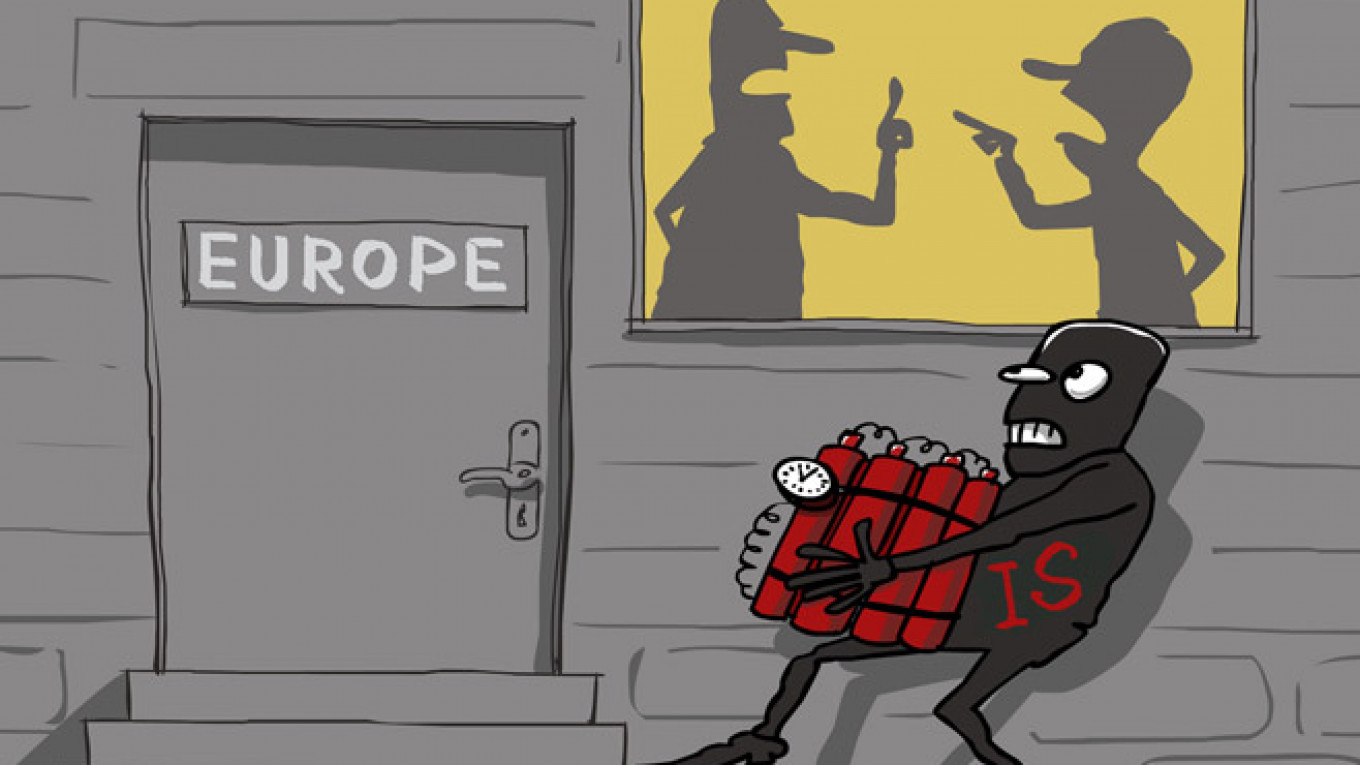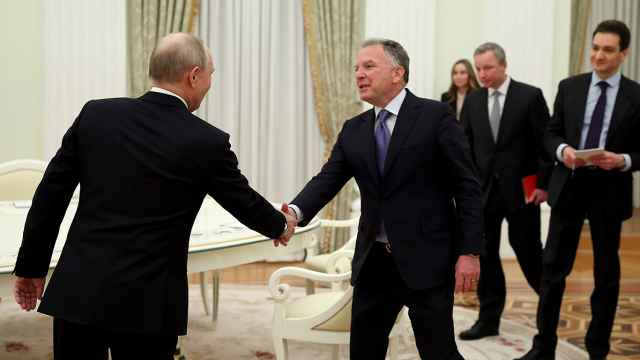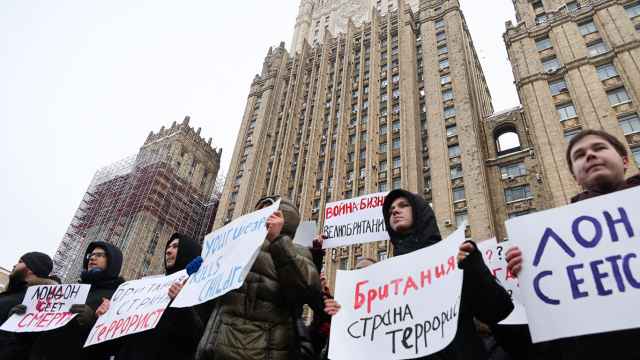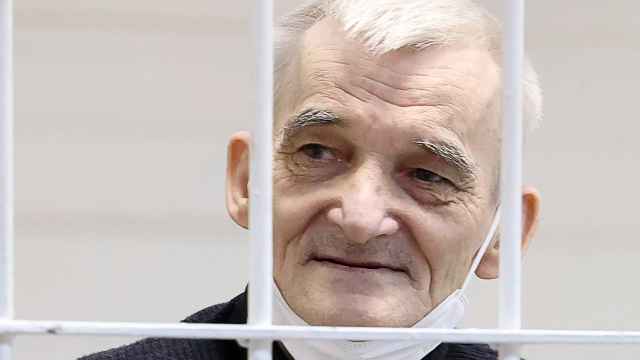As the NATO summit gets under way in Wales and world leaders put on a united front against the growing threat posed by radical terrorist organization the Islamic State, continued bickering between Russia and the West over events in Ukraine threatens to give the "apocalyptic" group carte blanche to pull off a devastating attack on European soil.
Western leaders have largely said what members of the public would want to hear after witnessing the beheading of two U.S. journalists in Syria, the slaughter of innocent women and children, and the forced starvation of hundreds of Yazidi refugees on Mount Sinjar in northern Iraq.
The Islamic State is a "cancer," U.S. President Barack Obama said. The group has an "apocalyptic" world view, according to a senior Pentagon official. And so, as U.S. Vice President Joe Biden said Wednesday, we will "follow them to the gates of hell."
Strong words, indeed. Yet a U.S. State Department press briefing Wednesday shows that these leaders have bad long-term memories, and their inability to think back to just a year ago threatens to make history repeat itself.
In the briefing, spokeswoman Jen Psaki spoke of the government's plan to form a coalition with other nations to fight the growing threat, yet no mention was made of Russia.
In fact, the only mention made of Russia at the briefing was in the context of the Ukraine conflict.
The briefing was held on the same day that members of the Islamic State released a video personally threatening Russian President Vladimir Putin and vowing to "liberate" Russia's North Caucasus, which for years has battled an Islamic insurgency of its own.
Islamic State fighters have plenty of reason to hate Putin in light of Russia supplying their foe Syrian President Bashar Assad with weapons throughout that country's conflict, and it would be a mistake to assume their video warning is an empty threat.
The Islamic State may practice a seventh-century version of Islam and have disavowed the Western lifestyle, but they're watching Russia and the U.S. engage in empty posturing over Ukraine just like the rest of the world, and where most see a pitiful diplomatic standoff, they no doubt see opportunity.
It would be as naive and dangerously shortsighted to assume that the Islamic State does not have plans to take advantage of the Western world's pissing match with Russia as it would be to believe that U.S.-Russian intelligence sharing has been left unscathed by the Ukraine conflict.
One only has to think back to April last year to recall a time when mistrust between Russia and the U.S. enabled a terrorist attack on Western soil: Several innocent people were killed and hundreds of others maimed in front of unsuspecting, cheering spectators in the Boston Marathon bombings.
Two young men with ties to Russia's southern republics of Chechnya and Dagestan were discovered to be behind the attack: Tamerlan and Dzhokhar Tsarnaev, who had emigrated to the U.S. from Russia years earlier.
For weeks after the attack, which killed three people and injured at least 264 more, U.S. officials struggled to comprehend how two seemingly untrained individuals could so easily stage a terrorist attack without even so much as suspicion from U.S. authorities.
Amid panicked finger-pointing between Russia and the U.S. in the aftermath of the attacks, a yearlong review of U.S. intelligence found that there had been a serious intelligence-sharing failure between the two nations.
U.S. authorities alleged that crucial information had been withheld by Russian security services in the run-up to the attacks, according to The New York Times, which cited a report by the U.S. inspector general of the Intelligence Community, responsible for 17 separate intelligence agencies.
Russian authorities maintained that they had repeatedly warned their U.S. counterparts.
It remains unclear whether closer cooperation could have prevented the attacks, but the breakdown in communication between the two sides is painfully clear, and most analysts attributed it to deep-rooted mistrust.
If there was mistrust at that time, long before conflict erupted in Ukraine and ushered in what has popularly been described as a second Cold War, there is cold-blooded resentment now.
But with thousands of trained fighters in the Middle East determined to obliterate the West, can the world afford it?
Even Middle Eastern leaders don't think so. On Monday, Saudi Arabia's King Abdullah warned that IS would reach Europe within a month and the U.S. a month later.
"These terrorists do not know the name of humanity, and you have witnessed them severing heads and giving them to children to walk with in the street," Abdullah said, urging world leaders to unite to fight the group.
With members from Europe, the U.S. and Russia, the Islamic State has rapidly gone from being just another terrorist organization blabbering on about wiping out Western civilization to a terrifying force disavowed even by al-Qaida.
By all accounts, the Boston bombing suspects were amateurs who probably would not have been able to hold their weight among Islamic State fighters.
Dzhokhar Tsarnaev, the surviving suspect and currently facing the death penalty, was not only a 19-year-old college kid with apparently no militant training, but was also somewhat of a pothead, according to his friends. His older brother Tamerlan — by far the more disciplined of the two — was an accomplished boxer who morphed into a devout Muslim, but he still lacked any meaningful terrorist training.
And yet these two young men managed to inflict a lasting trauma on the U.S., not only because they killed innocent people in a very brutal, very public way, but also because they showed just how easy it is to become a terrorist these days.
Even the bombs that they used were built using instructions widely available on the Internet.
The Islamic State has much more than the Tsarnaevs could have ever dreamed of: thousands of well-trained fighters from various countries, all holding different passports and capable of traversing borders with relative ease.
And there is good reason to believe that members of the Islamic State will not settle for simple pressure-cooker bombs, like the Tsarnaevs did. A recent report by Foreign Policy revealed that at least one member of the organization had been looking into bioterrorism and how to use the bubonic plague as a weapon.
The U.S. and Russia have clearly realized there is cause for alarm.
The U.S. has conducted airstrikes in Iraq, and Russia has sent attack helicopters to the Iraqi government in a bid to quash the Islamic State.
But the two countries have not given any indication that they intend to work together. Too busy butting heads over Ukraine, they fail to see what is right in front of their noses.
This was even more evident ahead of the NATO summit, as Russia's Defense Ministry on Wednesday reportedly suggested including the U.S. and NATO as "main enemies" in the country's official military doctrine, which already includes global terrorism as one of the nation's enemies.
Even in the aftermath of the Islamic State's threatening video message to Putin on Wednesday, Chechen leader Ramzan Kadyrov offered a response that managed to vilify both the Islamic State and the West at the same time, echoing conspiracy theories heard a million times throughout the Ukraine crisis.
The Islamic State fighters were "saying only what their masters in the West's security services were telling them to say," Kadyrov wrote on Instagram, toeing the earlier line of other Russian officials who have accused the U.S. of paying Ukrainians to wreak havoc during Kiev's Maidan protests so that the U.S. could swoop in and take control.
One can only hope that such jaded thinking has not affected cooperation between Russian and U.S. intelligence agencies, as both sides have a hell of a lot to lose if there is another communication breakdown.
Russian intelligence is a valuable asset in fighting the Islamic State, considering that at least one of the Islamic State's leaders, Abu Omar al-Shishani, is an ethnic Chechen from the Caucasus nation of Georgia.
There is plenty of evidence to suggest that the group has enlisted hundreds of other men from Russia's North Caucasus as well. A native Russian speaker can be heard in the video released by the group Wednesday, and several other videos of Islamic State fighters in Syria feature men who speak perfect Russian.
Last October, Alexander Bortnikov, head of the Federal Security Service, estimated that there were about 500 Russians fighting in Syria, as well as hundreds of others from former Soviet republics.
Syrian media reports have backed up Bortnikov's claims. Just last week, the Syrian news agency Zaman Alwasl reported that the Islamic State fighter behind recent military gains by the group in Raqqa was a national of Tajikistan. The same day, Azerbaijan's media reported that one of its champion wrestlers had gone to join the Islamic State in Syria.
Russian security services have also filed criminal charges against several men from the North Caucasus for fighting in Syria, and with them in custody, authorities likely have access to valuable intelligence about radical groups on the ground there.
U.S. intelligence services have been tracking Islamic State fighters closely, reportedly using social media to glean information about the fighters.
An American citizen, Douglas McCain, was killed while fighting alongside the Islamic State late last month, showing that U.S. citizens may be just as susceptible to falling for the organization's ideology as Russians in the North Caucasus are.
It is a sad truth that fighters from Russia and the West who have joined the Islamic State are more united in their cause than their former leaders, immune to the political dispute that has crippled the rational thinking of those in charge.
Somewhere in Syria, there may even be a Russian-born Islamic State fighter sitting next to an American-born fighter, the two of them laughing as the NATO summit opened Thursday with more alarmist talk of Russian aggression, more fist-shaking on both sides, and fewer eyes on the world's one common threat.
Contact the author at [email protected]
A Message from The Moscow Times:
Dear readers,
We are facing unprecedented challenges. Russia's Prosecutor General's Office has designated The Moscow Times as an "undesirable" organization, criminalizing our work and putting our staff at risk of prosecution. This follows our earlier unjust labeling as a "foreign agent."
These actions are direct attempts to silence independent journalism in Russia. The authorities claim our work "discredits the decisions of the Russian leadership." We see things differently: we strive to provide accurate, unbiased reporting on Russia.
We, the journalists of The Moscow Times, refuse to be silenced. But to continue our work, we need your help.
Your support, no matter how small, makes a world of difference. If you can, please support us monthly starting from just $2. It's quick to set up, and every contribution makes a significant impact.
By supporting The Moscow Times, you're defending open, independent journalism in the face of repression. Thank you for standing with us.
Remind me later.






